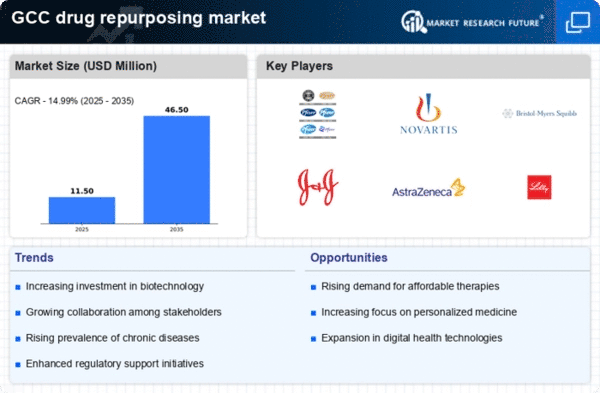Rising Prevalence of Chronic Diseases
The increasing incidence of chronic diseases in the GCC region is a primary driver for the drug repurposing market. Conditions such as diabetes, cardiovascular diseases, and cancer are becoming more prevalent, necessitating innovative treatment options. The World Health Organization indicates that chronic diseases account for approximately 70% of all deaths globally, a trend mirrored in the GCC. This rising burden creates a demand for cost-effective therapies, making drug repurposing an attractive option. By utilizing existing drugs for new therapeutic indications, healthcare providers can potentially reduce treatment costs and improve patient outcomes. The drug repurposing market is thus positioned to benefit from this growing need for effective management of chronic conditions, as it offers a faster route to market for new treatments, leveraging existing safety profiles of established medications.
Economic Pressures and Healthcare Costs
Economic factors play a crucial role in shaping the drug repurposing market. In the GCC, healthcare expenditures are rising, driven by an increasing population and higher demand for medical services. The drug repurposing market offers a solution to mitigate these costs by providing alternative treatment options that are often less expensive to develop than new drugs. According to recent data, the average cost of bringing a new drug to market can exceed $2.6 billion, while repurposing existing drugs can significantly lower this figure. This economic advantage is particularly appealing to healthcare systems in the GCC, where budget constraints are prevalent. As stakeholders seek to optimize healthcare spending, the drug repurposing market is likely to gain traction as a viable strategy for addressing the financial challenges faced by the region's healthcare systems.
Patient-Centric Approaches in Healthcare
The shift towards patient-centric healthcare models is influencing the drug repurposing market. In the GCC, there is a growing emphasis on personalized medicine and tailored treatment plans that cater to individual patient needs. This trend encourages the exploration of existing drugs for new indications that may better serve specific patient populations. The drug repurposing market aligns well with this approach, as it allows for the rapid adaptation of treatments based on patient feedback and clinical outcomes. By focusing on the unique characteristics of patients, healthcare providers can enhance treatment efficacy and improve overall satisfaction. This patient-centric paradigm is likely to drive interest in drug repurposing, as it offers a pathway to develop therapies that are more aligned with the diverse needs of the population in the GCC.
Growing Investment in Research and Development
Investment in research and development (R&D) is a significant driver of the drug repurposing market. In the GCC, governments and private sectors are increasingly allocating funds to support innovative healthcare solutions. This trend is evident in the establishment of various research initiatives aimed at exploring new uses for existing drugs. The drug repurposing market stands to benefit from this influx of capital, as it enables researchers to conduct clinical trials and gather data on the efficacy of repurposed drugs. Furthermore, the GCC's commitment to enhancing its healthcare infrastructure and fostering innovation creates a conducive environment for drug repurposing initiatives. As R&D investments continue to rise, the potential for discovering new therapeutic applications for existing medications expands, thereby driving growth in the drug repurposing market.
Regulatory Advancements and Supportive Frameworks
Regulatory advancements in the GCC are fostering a more supportive environment for the drug repurposing market. Recent initiatives aimed at streamlining the approval process for repurposed drugs are encouraging pharmaceutical companies to explore this avenue. The drug repurposing market benefits from these regulatory changes, as they reduce the time and resources required to bring new treatments to market. For instance, expedited review processes and simplified clinical trial requirements can significantly enhance the feasibility of repurposing existing medications. As regulatory bodies in the GCC continue to adapt their frameworks to support innovation, the drug repurposing market is likely to experience accelerated growth, enabling quicker access to potentially life-saving therapies for patients.
















